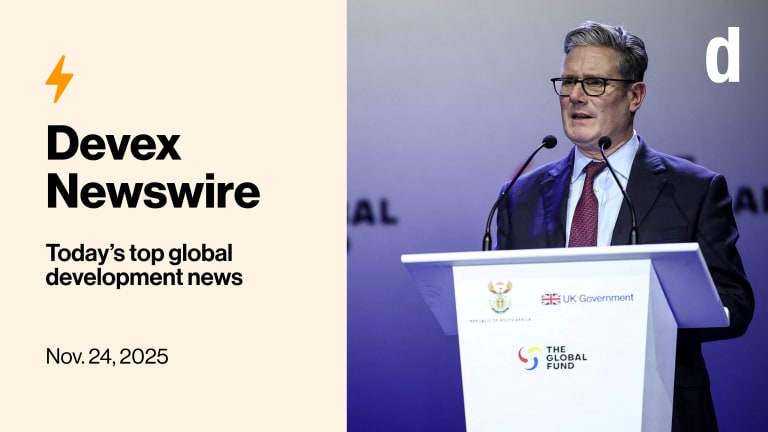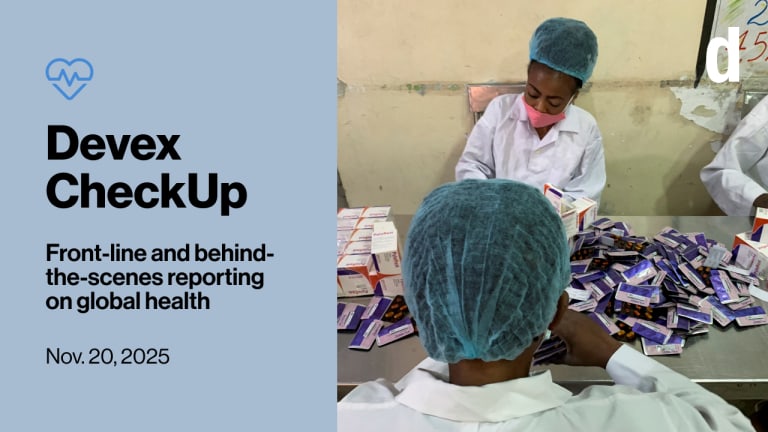Funders commit to COVID-19 vaccine access but US opts out

LONDON/WASHINGTON — Twenty-five key players are pledging to make new vaccines and treatments for COVID-19 accessible around the world, following concerns that access for lower-income countries might not be prioritized.
The COV-Access Agreement, launched virtually by the World Health Organization on Friday, commits countries to a cooperative international response to the pandemic and “equitable global access to innovative tools for COVID-19 for all.”
COVID-19 — a timeline of the coronavirus outbreak
Follow the latest developments on the new coronavirus that causes COVID-19.
Leading funders including the U.K., France, Germany, the European Commission, the World Bank, and the Bill & Melinda Gates Foundation signed the pledge, alongside Gavi, the Global Fund, and the International Federation of Pharmaceutical Manufacturers.
But the U.S. — the world’s biggest bilateral donor, which recently suspended funding to WHO — was conspicuously absent from the agreement, which health experts said was “concerning.”
“There will be no U.S. official participation,” a spokesperson for the country’s mission in Geneva confirmed to Reuters.
Alongside equitable global access, the agreement also commits to an “unprecedented level” of international coordination and research cooperation, collective decision-making on coronavirus responses, and accountability “to the world.”
The U.K. — which has been a leading donor to coronavirus research — took credit for helping to organize the pledge, saying the agreement followed “continued international lobbying from the UK for more global co-operation on the pandemic,” including at meetings of the G-20 and World Bank. On May 4, the country will co-host a virtual Coronavirus Global Response Summit, which aims to raise £7 billion ($8.7 billion) for diagnostics, vaccines, and treatments.
“It would be a tragedy if the US absence from this global effort means ... that the countries where US global health has invested for decades miss out on the full benefit.”
— Amanda Glassman, executive vice president, Center for Global DevelopmentExperts criticized the U.S. decision not to participate in the pledge and suggested it could have been based on WHO’s involvement. Amanda Glassman, executive vice president at the Center for Global Development think tank, told Devex via email: "As the US is by far the largest funder in global health, its absence from an initiative organized by one of our closest allies (UK) is troubling.
“A vaccine or treatment may be developed anywhere in the world — it would be a tragedy if the US absence from this global effort means ... that the countries where US global health has invested for decades miss out on the full benefit.”
Dr. Kate Tulenko, CEO of Corvus Health, a health care consulting company, agreed that “it is very concerning that the U.S. has not signed this agreement” given its “outsized role” in vaccine development. She noted that the HPV and pneumococcal vaccines — the last two additions to the international set of vaccines — were both developed with significant U.S. involvement.
However, she suggested the move could be a play to get countries such as India and China to invest more in health or to appease parts of the government’s voter base.
“Despite how distressing this is, I think this action is not a sign that the U.S. will reduce its investments in vaccine development and availability,” she said.
WHO has also appointed two special envoys on vaccine research and equity: Sir Andrew Witty, former chief executive at GlaxoSmithKline, and Ngozi Okonjo-Iweala, a Gavi board member.
Visit our dedicated COVID-19 page for news, job opportunities, and funding insights.

Search for articles
Most Read
- 1
- 2
- 3
- 4
- 5









